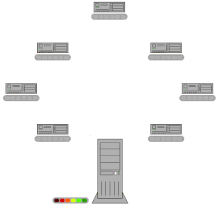Internet file sharing
practice of distributing or providing access to digitally stored information
Internet File Sharing refers to the often illegal distribution and trading of movies, music and software via the internet (or digitally).

But that's not what the media companies say they believe. In their official narrative – bolstered by a long line of studies with undocumented methodologies and assumptions – is that poor countries simply lack a "culture of copyright" that can be reinforced through education and enforcement. ~ Cory Doctorow


| This theme article is a stub. You can help out with Wikiquote by expanding it! |
Quotes
edit- Media Piracy's core thesis is simple: people in the poor world don't pay for software, games, music and movies because these goods cost too much. Whereas a DVD here might cost you an hour's wage, the same DVD in a poor country could cost a day's work, or a week's, or even more. In poor markets where legitimate media costs the same (in relative terms) as it does in rich markets, the amount of licit purchasing is about the same.
But that's not what the media companies say they believe. In their official narrative – bolstered by a long line of studies with undocumented methodologies and assumptions – is that poor countries simply lack a "culture of copyright" that can be reinforced through education and enforcement.
Karganis and co have much to say on this score. They document the way that the airwaves and newspapers in poor countries are dominated by the official, Hollywood view of piracy, presented uncritically and at length. The message is even integrated into the school curriculum through official teaching units produced by American entertainment conglomerates and given to teachers to be delivered verbatim to their students.
On the enforcement side, entertainment companies often secure a kind of rough, streamlined justice that allows them to race to the head of the justice line, pushing past criminal and civil cases of much larger magnitude. They get their own police forces tasked to them, and their own special high-grade punishments that treat offences against them as inherently graver than offences against local firms and people.- Cory Doctorow, “Why poor countries lead the world in piracy”, The Guardian, (3 May 2011).
- I am speechless about the idea of putting music fans in jail for downloading music. It is wrong to illegally download, but the answer cannot be jail. Here in America we create new opportunities out of adversity, not punitive laws, and we should look to new technologies like Apple's new Music Store for solutions. This way, innovation continues to be the hallmark of America. It is the fans that drive the success of the music business.
- Michael Jackson, press statement (21 July 2003), quoted in "Jackson attacks music piracy bill" in BBC News, (22 July 2003).
- If they succeed in destroying our books or even making many of them inaccessible, there will be a chilling effect on the hundreds of other libraries that lend digitized books as we do. This could be the burning of the Library of Alexandria moment—millions of books from our community's libraries—gone.
- Brewster Kahle according to Four publishers are trying to destroy the Internet Archive and digital lending (Today 3:54 PM)
- Media piracy has been called "a global scourge," "an international plague," and "nirvana for criminals," but it is probably better described as a global pricing problem. High prices for media goods, low incomes, and cheap digital technologies are the main ingredients of global media piracy. If piracy is ubiquitous in most parts of the world, it is because these conditions are ubiquitous. Relative to local incomes in Brazil, Russia, or South Africa, the price of a CD, DVD, or copy of Microsoft Office is five to ten times higher than in the United States or Europe. Licit media goods are luxury items in most parts of the world, and licit media markets are correspondingly tiny. Industry estimates of high rates of piracy in emerging markets- 68% for software in Russia, 82% for music in Mexico, 90% for movies in India-reflects this disparity and may even understate the prevalence of pirated goods.
Acknowledging these price effects is to view piracy from the consumption side rather than the production side of the global media economy. Piracy imposes an array of costs on producers and distributors- both domestic and international- but it also provides the main form of access in developing countries to a wide range of media goods, from recorded music, to film, to software. This last point is critical to understanding the trade offs that define piracy and enforcement in emerging markets. The enormously successful globalization of media culture has not been accompanied by a comparable democratization of media access - at least in its legal forms. The flood of legal media goods available in high-income countries over the past two decades has been a trickle in most parts of the world.- Joe Karaganis, "Media Piracy in Emerging Economies", (2011), p. i.
- [D]omestic piracy may well impose losses on specific industrial sectors, but these are not losses to the larger national economy. Within a given country the piracy of domestic goods is a transfer of income, not a loss. Money saved by consumers or businesses on CDs, DVDs, or software will not disappear but rather be spent on other things-housing, food, other entertainment, other business expenses, and so on. These expenditures, in turn, will generate tax revenue, new jobs, infrastructural investments, and the range of other goods that are typically cited in the loss column of industry analyses.
For our part, we take seriously the possibility that the consumer surplus from piracy might be more productive, socially valuable, and or job creating than additional investment in the software and media sectors. We think this likelihood increases in markets for entertainment goods, which contribute to growth but add little to productivity, and still further in countries that import most of their audiovisual goods and software - in short, virtually everywhere outside the United States.- Joe Karaganis, "Media Piracy in Emerging Economies", (2011), p. 16.
- P2P continues to account for a high percentage of total bandwidth utilization in most poarts of the world, and infringing files represent, by most accounts, a very high percentage of P2P content (Felton 2010; IFPI 2006). ISP-traffic monitoring firm ipoque put P2P use in 2009 at roughly 70% of total bandwidth in Eastern Europe, 60% in South America, and slightly lower percentages in northern and southern Europe (Schulze and Mochalski 2009). US rates are generally estimated at 25%-30%, reflecting not so much lower utilization of P2P as higher utilization of streaming video services such as YouTube and Hulu.
- Joe Karaganis, "Media Piracy in Emerging Economies", (2011), p. 30.
- Recent IIPA reports cite rates of music piracy in excess of 90% in China, India, Mexico, and Brazil. Less and less of this traffic takes place on the street, as physical piracy shifts toward the narrower stock and higher margins of DVDs.
- Joe Karaganis, "Media Piracy in Emerging Economies", (2011), p. 44.
- Child pornography is great. Politicians do not understand file sharing, but they understand child pornography, and they want to filter that to score points with the public. Once we get them to filter child pornography, we can get them to extend the block to file sharing.
We must filter the Internet to win over online file sharing. But politicians don’t understand that file sharing is bad, and this is a problem for us. Therefore, we must associate file sharing with child pornography. Because that’s something the politicians understand, and something they want to filter off the Internet.- Johan Schlüter, antipiracy activist, speaking about political tactics to an audience of copyright industry insiders (May 27, 2007), "The Copyright Industry Absolutely Loves Child Pornography", as reported by Rick Falkvinge, Torrent Freak, (July 9, 2011).
- If there's anyone out there involved in illegal movie piracy ... don't do it. Take a good look at these people. These are the people you're stealing from. Look at them! Face what you've done! There are women here who can barely afford enough gown to cover their breasts.
- Jon Stewart at the Academy Awards, March 5, 2006.
- There is no justice in following unjust laws. It’s time to come into the light and, in the grand tradition of civil disobedience, declare our opposition to this private theft of public culture.
- We need to take information, wherever it is stored, make our copies and share them with the world. We need to take stuff that's out of copyright and add it to the archive. We need to buy secret databases and put them on the Web. We need to download scientific journals and upload them to file sharing networks. We need to fight for Guerilla Open Access.
- With enough of us, around the world, we’ll not just send a strong message opposing the privatization of knowledge — we’ll make it a thing of the past. Will you join us?